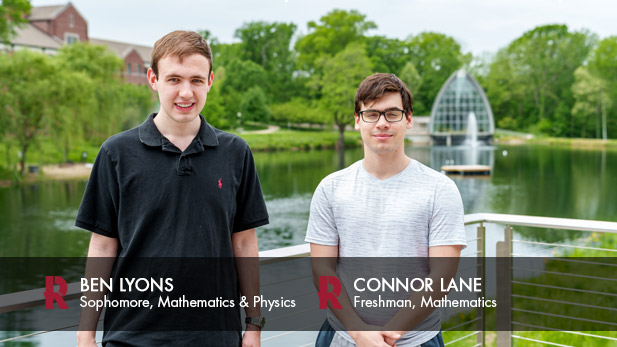Rose-Hulman Math Majors Score Among Top Competitors in Nation in Math Competition

First-year student Connor Lane and sophomore Ben Lyons, who are friends and homework buddies, competed in the William Lowell Putnam Mathematical Competition, considered the preeminent math contest for undergraduates. They scored among the top 7% of competitors in the nation.
In a mathematics competition in which scoring even a single point is considered an accomplishment, two Rose-Hulman students scored among the top 7% of competitors in the nation.
First-year student Connor Lane and sophomore Ben Lyons, who are friends and homework buddies, competed in the William Lowell Putnam Mathematical Competition, considered the preeminent math contest for undergraduates.
They and 12 other Rose students were among 3,415 undergraduates who on Dec. 3 were tasked with answering six math problems in each of two three-hour sessions held at their respective college campuses.
Lane, of Winnetka, a Chicago suburb, scored 38, which placed him 164th in the rankings. Lyons, who comes from Omaha, Nebraska, scored 31 and was ranked 235th. The highest score was 101 out of 120, and 62.5% of the competitors scored zero.
Why? Consider this, ostensibly one of the easier problems on the test Lane and Lyon took:
Determine all ordered pairs of real numbers (a, b) such that the line y = ax + b intersects the curve
y = 1n(1+ x2) in exactly one point.
The solution is three-quarters of a page long. (All of the 2022 test questions and their solutions can be found at https://www.maa.org/math-competitions/william-lowell-putnam-mathematical-competition.)
Ten of Rose’s team members got positive scores and the team ranking, determined by the ranks of its top three scorers, was 51 out of 456 institutions, said Sylvia Carlisle, PhD, associate professor of mathematics.
Lane and Lyons “are driven, curious, talented students,” said Carlisle, who for the past decade has organized Putnam practice sessions for Rose students. “They put considerable time and energy into learning and doing mathematics, both in and outside of their classes.”
Both were “enthusiastic participants” in practice sessions, Carlisle said, and “Connor in particular was a great source of math contest tips.”
Lyons said the practice sessions gave them “useful, necessary problem-solving techniques” and his Rose math classes – especially the homework – also were helpful. “The prompts on those homework (assignments) are not trivial,” he said, “and by doing those problems, you develop the persistence to find the right idea that’s necessary in order to do well in competition.”
Lane said he found it helpful to “just solve problem after problem after problem. … Eventually you end up with a bag of tricks.”
Both students are majoring in math, and Lyons plans to add a second degree in physics in the fall to prepare for a career in academia “on the boundary of math and physics.” Lane also wants to be a math professor. Both plan to seek advanced degrees after graduating from Rose.
Lyons, who remembers doing arithmetic problems for fun when he was 5 or 6, has been accepted into the National Science Foundation program called Research Experiences for Undergraduates at Indiana University this summer. He participated in the same program at Rose in summer 2022.
Lane, who plans to become a tutor next school year, recognized his interest in math in eighth grade after coming across a math-related YouTube video. That inspired him, as did sibling rivalry; he recently explained differential equations to his older brother, an environmental engineering student at Cornell University.
Both Lane and Lyons participated in math competitions in high school, and Lyons took part in the Putnam competition in his freshman year. Both plan to do so again. They even say participating is fun.
“There's not really too much pressure” since their showing in the competition doesn’t affect their grades, Lyons said. Having participated will be a resume boost when he applies for graduate school, he said.
Lane likewise feels little pressure and expects to merely “casually” practice for the next competition.
“Competitions are fun,” he said, “but real math isn’t competition. So that’s not something that I need to care too much about.”